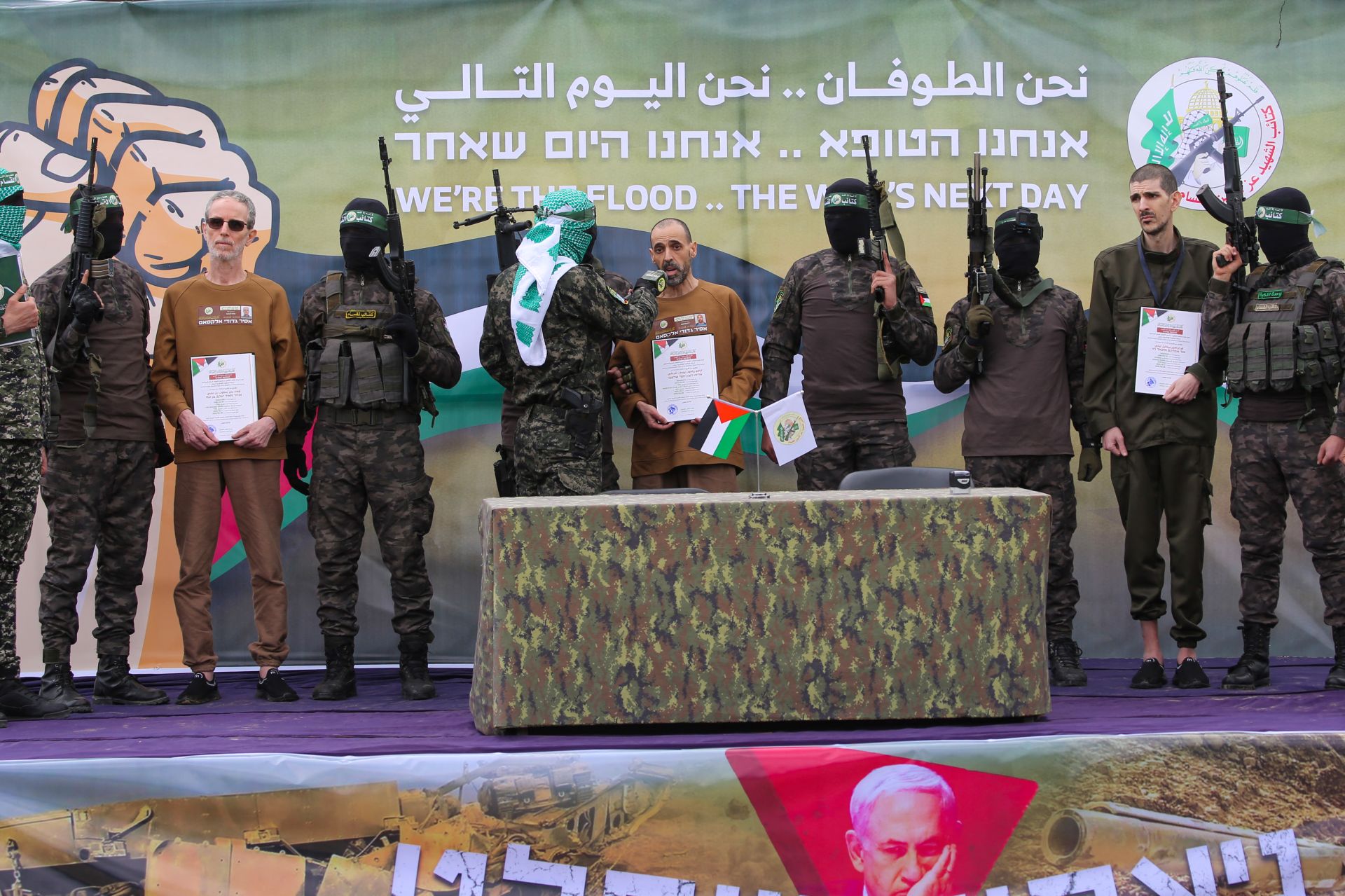- Home
- Middle East
- Hamas Hands Over Three Israeli Hostages in Fifth Gaza Exchange

Palestinian Hamas fighters escort(L-R) Ohad Ben Ami, Or Levy and Eli Sharabi on a stage before handing them over to a Red Cross team in Deir el-Balah, central Gaza, on February 8, 2025, as part of the fifth hostage-prisoner exchange of a fragile ceasefire. ©Eyad BABA / AFP
Hamas militants handed over three Israeli hostages on Saturday as part of the fifth exchange under a fragile Gaza ceasefire, with 183 prisoners held by Israel due to be released later in the day.
The swap comes after US President Donald Trump proposed clearing out the Gaza Strip of its inhabitants and for the United States to take over the Palestinian territory—a plan that has sparked global uproar and been rejected by Hamas.
Jubilant crowds in Israel's commercial hub, Tel Aviv, cheered as they watched live footage of the three hostages, flanked by masked gunmen, brought on stage in Deir el-Balah before being handed over to the International Committee of the Red Cross.
The stage was festooned with a banner bearing images of destroyed Israeli armored vehicles and a dejected-looking Benjamin Netanyahu, Israel's prime minister.
Dozens of armed Hamas fighters had formed a cordon around the open area where the release took place, apparently to control crowds of onlookers.
The three hostages were identified as Eli Sharabi, Or Levy, and Ohad Ben Ami.
Sharabi, 52, was at his home in kibbutz Beeri with his British-born wife and their two daughters when militants stormed it.
The armed men shot their dog before locking the family in their safe room and setting it on fire. The bodies of his wife and two daughters were later identified.
Levy was abducted from the Nova music festival, where gunmen murdered his wife. Ben Ami, who has dual Israeli-German citizenship, turned 56 in captivity.
'Now is the time.'
Former hostage Yarden Bibas, who was freed last week by Hamas militants in Gaza, on Friday urged Netanyahu to help bring back his wife and two children from the Palestinian territory.
"Prime Minister Netanyahu, I'm now addressing you with my own words... bring my family back, bring my friends back, bring everyone home," Bibas said in his first public message following his release.
Hamas previously said his wife Shiri and his two sons Ariel and Kfir—the youngest hostages—were dead, but Israel has not confirmed their deaths.
Netanyahu, who is in Washington, will "monitor this phase of the hostages' release from the control center of the delegation in the US", the premier's office said in a separate statement.
The Hostage and Missing Families Forum urged the government on Friday to stick with the Gaza truce, even as Trump's comments sparked backlash across the Middle East and beyond.
"An entire nation demands to see the hostages return home," the Israeli campaign group said in a statement.
"Now is the time to ensure the agreement is completed—until the very last one," it added.
Israel and Hamas have completed four swaps under the first stage of the ceasefire agreement.
Emaciated Faces
Stupefaction sweeps through the crowd gathered at the “Hostages’ Square” in Tel Aviv as the gaunt faces of three Israeli hostages appear live from Deir al-Balah in the Gaza Strip.
On a giant screen, Ohad Ben-Ami, Eli Sharabi, and Or Levy walk toward a platform, flanked by armed men from Hamas’s military wing.
Hundreds of people, who have flocked to this symbolic gathering place for the hostage campaign, watch in stunned silence. They have spent nearly 500 days in captivity—their bodies emaciated, their faces drawn.
It is the first time since the beginning of this truce that released hostages appear so visibly affected. In their eyes: fear, physical pain—perhaps even an absence.
In the coastal metropolis, less than 100 kilometers from the site of their release, several people cover their mouths with their hands, while others shake their heads in disbelief.
Moments earlier, the crowd had been jubilant, regularly applauding as Israeli television broadcasted the preparations for their release.
Yet soon, consternation gives way to joy once more—the relief of seeing more compatriots on their way back to Israel.
With AFP
Read more



Comments